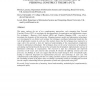1075 search results - page 10 / 215 » Using Activity Theory to Model Context Awareness |
ECIS
2004
13 years 9 months ago
2004
This paper explores the use of two complementary approaches, each stemming from Personal Construct Theory (PCT), to investigate the interdependence of organizations and informatio...
JUCS
2006
13 years 7 months ago
2006
: Ambient Intelligent (AmI) vision is a new concept materialized by the Six Framework Program of the European Community. It involves three key technologies: Ubiquitous Computing, U...
ICDE
2007
IEEE
14 years 2 months ago
2007
IEEE
To better serve users’ information needs without requiring comprehensive queries from users, a simple yet effective technique is to explore the preferences of users. Since these...
ICEBE
2005
IEEE
14 years 1 months ago
2005
IEEE
Uncertainty always exists as an unavoidable factor when developing context-aware applications for pervasive computing environments [1][2][3][4]. In this paper, we propose a unifie...
PERCOM
2004
ACM
14 years 7 months ago
2004
ACM
In this paper, we analyze the role of the social group in a Ubiquitous Computing (Ubicomp) environment as a source of contextual information. A model is presented to address the s...

